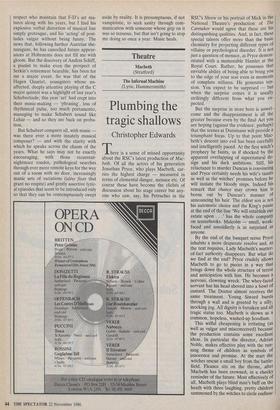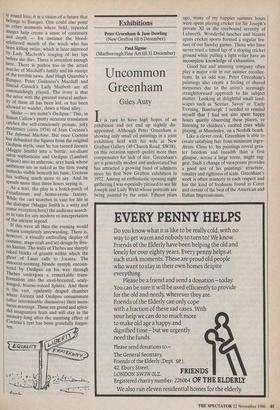Theatre
The Infernal Machine (Lyric, Hammersmith) Macbeth (Stratford)
Plumbing the tragic shallows
Christopher Edwards
There is a sense of missed opportunity about the RSC's latest production of Mac- beth. Of all the actors of his generation Jonathan Pryce, who plays Macbeth, car- ries the highest charge — measured in terms of elemental danger, menace etc. Of course these have become the clichés of discussion about his stage career but any- one who saw, say, his Petruchio in the RSC's Shrew or his portrait of Mick in the National Theatre's production of The Caretaker would agree that these are his distinguishing qualities. And, in fact, these special talents offer more than the basic chemistry for projecting different types of villainy or psychological disorder. It is not just a question of menace, as Pryce demon- strated with a memorable Hamlet at the Royal Court. Rather, he possesses that enviable ability of being able to bring you to the edge of your seat even in moments of complete stillness. He generates ten- sion. You expect to be surprised — but when the surprise comes it is usually strikingly different from what you ex- pected. But the surprise in store here is unwel- come and the disappointment is all the greater because even by the final Act you are hoping (against the evidence, perhaps) that the scenes at Dunsinane will provide a triumphant focus. Up to that point Mac- beth's descent into evil has been carefullY and intelligently paced. At the first witch's prophecy he faints, as if shocked by the apparent overlapping of supernatural de- sign and his dark ambitions. Still, his reluctance to murder Duncan is convincing and Pryce certainly needs his wife's taunts as well as the witches' promises before he will initiate the bloody steps. Indeed his remark that chance may crown him is borne out by Duncan's manner of announcing his heir. The eldest son is not his automatic choice and the King's pause at the end of the line 'We will establish our estate upon . .' has the whole company on tenterhooks. Malcolm — small, weak- faced and unsoldierly is as surprised as anyone.
By the end of the banquet scene Pryce inhabits a more desperate resolve and, as the text requires, Lady Macbeth's matter- of-fact authority disappears. But what do we find at the end? Pryce crudely allows Macbeth to go to pieces in a way that brings down the whole structure of terror and anticipation with him. He becomes a nervous, clowning wreck. The whey-faced servant has his head shoved into a bowl of custard. The Doctor almost receives the same treatment. Young Siward bursts through a wall and is greeted by a silly, mocking jog. All dignity is forsaken and all tragic status too. Macbeth is shown as a common, hopeless, washed-up hoodlum.
This wilful cheapening is irritating (as well as vulgar and misconceived) because the production contains some excellent ideas. In particular the director, Adrian Noble, makes effective play with the run- ning theme of children as symbols of innocence and promise. At the start the witches rescue a small boy from the battle- field. Fleance sits on the throne, after Macbeth has been crowned, in a cheeky reminder of the future. Most effectively of all, Macbeth plays blind man's buff on the heath with three laughing, pretty children summoned by the witches to circle endless- ly round him; it is a vision of a future that belongs to Banquo. One could also point to other moments where bold, repeated images help create a sense of continuity and depth — for instance the blood- splattered mouth of the witch who has been killing swine, which is later mirrored by Lady Macbeth's rouging of her lips before she dies. There is invention enough here. There is pathos too in the actual murder of Macduff's family and his receipt of the terrible news. And Hugh Quarshie's Banque, Peter Guinness's Macduff and Sinead Cusack's Lady Macbeth are all commandingly played. The irony is that the actor with the greatest natural author- ity of them all has been led, or has been allowed to wander, down a blind alley. `Shake — my name's Oedipus.' This, in Simon Cailow's pretty accurate translation catches the self-consciously prosaic, joky modernity (circa 1934) of Jean Cocteau's The Infernal Machine. But once Cocteau has debunked the figures from the original Oedipus myth, once he has turned Jocasta (Maggie Smith). into a brittle, soi-disant salon sophisticate and Oedipus (Lambert Wilson) into an unheroic, sexy hunk whose ambitions are as naked as the firm young buttocks visible beneath his tunic, Cocteau has nothing much more to say. And he spends more than three hours saying it. As a text, the play is a hotch-potch of Freudianism and homo-erotic fantasy. While the cast searches in vain for life in the dialogue (Maggie Smith is a witty and comic exception here) the audience search- es in vain for any modern re-interpretation of the ancient legend. If this were all then the evening would remain completely unrewarding. There is, however, a visually enthralling display of costume, stage-craft and set-design by Bru- no Santini. The walls of Thebes are sharply raked blocks of granite within which the ghost of Laius calls to Jocasta. The innocent-seeming blonde nymph encoun- tered. by Oedipus on his way through Thebes undergoes a remarkable trans- formation into the steel-breasted, scaly- winged, hoarse-voiced Sphinx. And there is the vast, opulently draped chamber where Jocasta and Oedipus consummate (after interminable discussion) their inces- tuous marriage. These are grand and splen- did imaginative feats and will stay in the memory long after the numbing effect of Cocteau's text has been gratefully forgot- ten.



























































 Previous page
Previous page